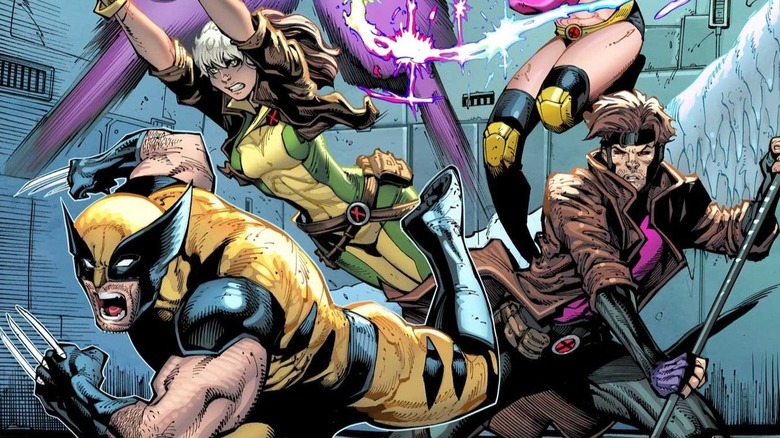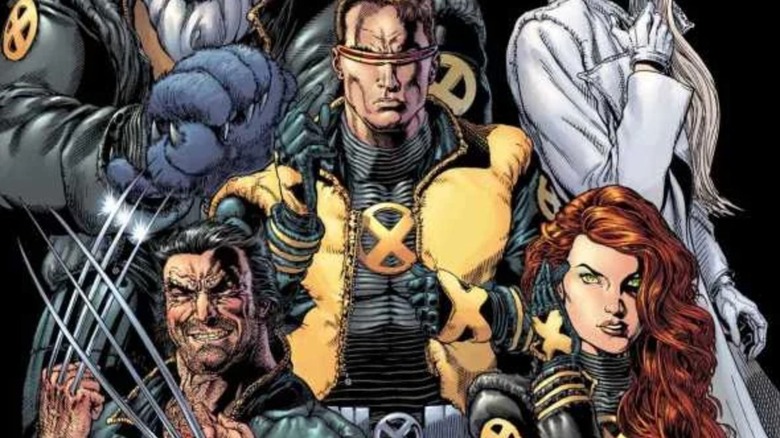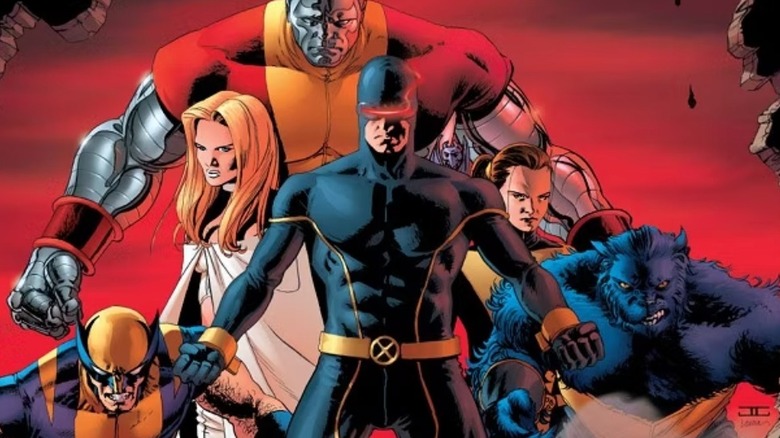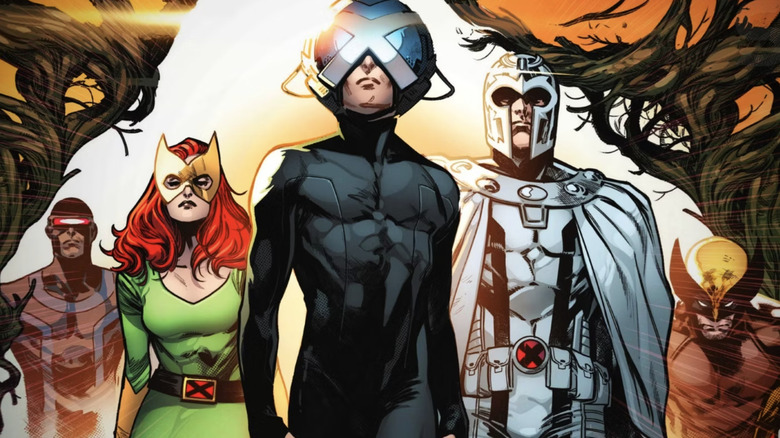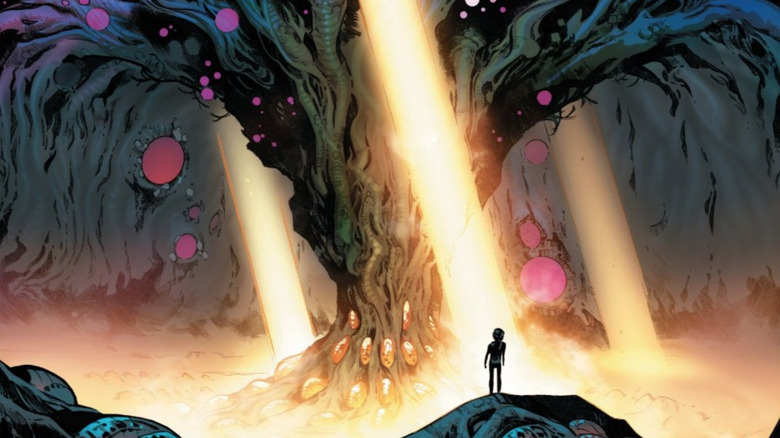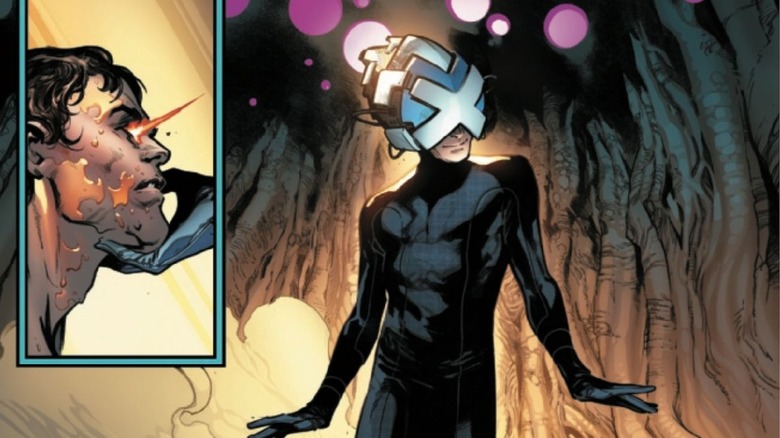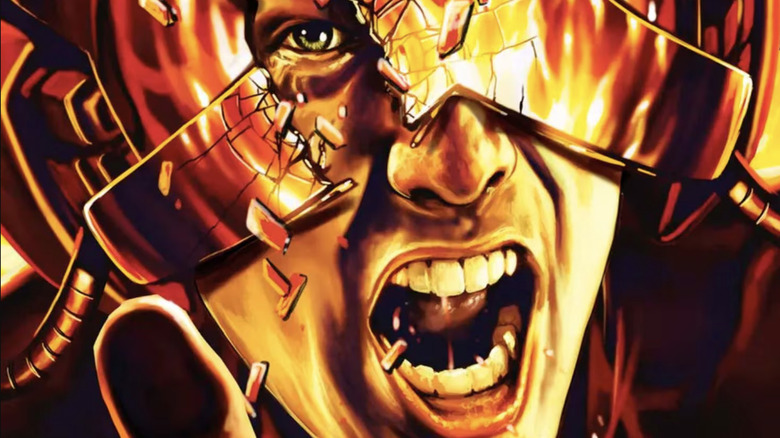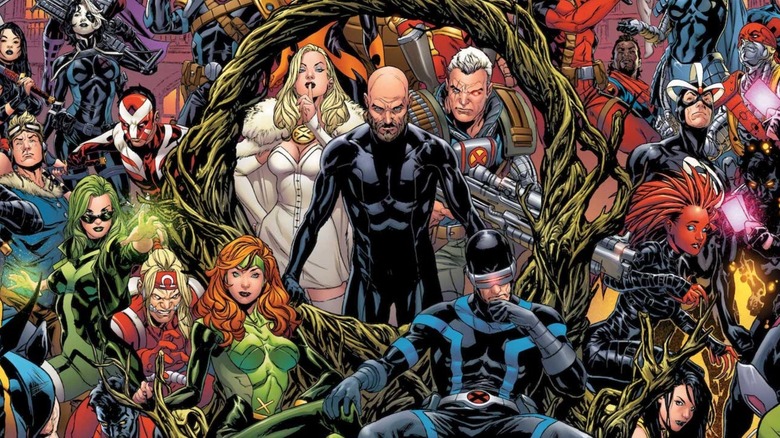Marvel's X-Men Comics Are Repeating A Major Mistake
The animated X-Men are about to make their return to TV in "X-Men '97." This Disney+ series is basically a thirty-year-late sixth season of 1992's "X-Men," the first cartoon about the Marvel Comics superhero team (or at least, the first to get past the pilot episode).
The "X-Men" comics kept chugging along through highs and lows while their animated counterparts were in limbo, though. At SXSW 2024, Marvel previewed the comics' future. A relaunch is coming to "X-Men" in Summer 2024 under the banner "From The Ashes," the follow-up to the ongoing "Fall of X." There'll be three primary series at first:
-
"X-Men" by Jed MacKay and Ryan Stegman. Cyclops and Magneto will lead a traditional X-Men superhero team based in Alaska.
-
"Uncanny X-Men" by Gail Simone and David Marquez. "Outlaw" lovebirds Gambit and Rogue head to New Orleans with Wolverine, Nightcrawler, and Jubilee in tow.
-
"Extraordinary X-Men" by Eve Ewing and Carmen Carnero. Set in Chicago, Kitty Pryde and Emma Frost will be teaching a new class of mutant students.
Advertisement
There's some exciting news here, particularly Simone's involvement. She's a living comic book legend (the literary analysis framework "Women in Refrigerators"? That's her brainchild). The set-up of her book, Rogue and Gambit on the run together, sounds perfectly in tune with the funny, sexy superheroes she writes (check out "Double Date," Simone's episode of "Justice League Unlimited" starring Green Arrow & Black Canary and The Huntress & The Question).
Still, "From The Ashes" feels like it's putting these characters back in their comfort zones instead of new territory. It's all the more galling since these books follow the most ambitious era for the X-Men since Chris Claremont was writing them. Some fans are peeved and I fear Marvel is repeating the mistakes that left the X-Men in a creative rut during the 2010s.
The New X-Men by Grant Morrison
Let's go back a couple of decades and look at the last time "X-Men" comics went brave and bold. Grant Morrison wrote "New X-Men" from 2001 to 2004. In their pitch manifesto, Morrison notes "X-Men" spent the 1970s through the 1990s as the coolest book Marvel was publishing. To make it so again, the book had to move away from the company's "conservative" tendency of only appealing to readers they already had.
Keep in mind that the X-Men only became icons because of change. The title's debut run in the 1960s was rather unsuccessful. In 1975, the team was revived for "Giant-Size X-Men" #1 (by Len Wein and Dave Cockrum), featuring an almost entirely new line-up. By the 2000s, though, the "Second Genesis" of "X-Men" was now old hat, so it was time to pivot again.
Morrison (initially partnered with artist Frank Quitely) ditched the classic X-Men costumes to be more like the movies; the team now had uniform black-and-yellow leather jackets. In their manifesto, Morrison said they intended to use established "X-Men" concepts as "window dressing" into weirder, hipper sci-fi stories and they delivered. Morrison's "New X-Men" made the world of mutants feel bigger than ever before; superpowers got weirder and weirder and Morrison's incendiary counterculture sensibilities bled into the comics.
I don't love every decision Morrison made with "X-Men" (they write Magneto more like Jack Kirby and Stan Lee's paper-thin tyrant, not Chris Claremont's tortured antihero, and Morrison's unrealized plans for Rogue were puzzling), but that's the price of experimentation. I, personally, say it's a fair trade.
Astonishing X-Men by Joss Whedon
Reading Morrison's pitch manifesto, one gleans that they didn't envision their run as a mere phase to get readers back on board, but as the dawn of a new era. Once they departed though, that's not how it happened.
After Morrison's 40-issue run concluded in 2004, Marvel recruited Joss Whedon (creator of "Buffy the Vampire Slayer") to pen the X-Men next. Whedon was a comic book fan who called "X-Men" his favorite (and an inspiration for "Buffy") and with his skeletons still buried in the closet, he was on top of geek culture.
The new series "Astonishing X-Men" (art by John Cassaday) was acclaimed just like Morrison's. Indeed, it's a fun run with good character moments (for Cyclops especially) and witty lines, while Whedon and Cassaday left their mark by creating enduring "X-Men" characters. Still, some high-profile X-fans (like "Cerebro" podcast host Connor Goldsmith) have pinpointed "Astonishing" as a regressive run, especially coming right after Morrison.
Whedon followed up the narrative threads Morrison left but pushed the X-Men back towards the familiar (down to giving them their old costumes back). "Astonishing X-Men" was basically just a superhero soap opera, with any science-fiction or counterculture ideas pushed into the background.
The return to the familiar also portended the creative rut that the X-Men got stuck in after Scarlet Witch said "No More Mutants" in "House of M" and made mutant-kind more imperiled than ever before. Mix that with the Marvel Cinematic Universe's influence forcing the X-Men into a backseat, and it's no surprise that in 2019, new "X-Men" writer Jonathan Hickman dubbed the post-Morrison years "The Lost Decade."
The New Gods of Krakoa
2019 was the year of mutant salvation thanks to Hickman and artists Pepe Larraz and R.B. Silva's conjoined mini-series, "House of X/Powers of X." In these books, Professor X and Magneto finally put aside their differences and build a mutant homeland on the living island of Krakoa. Mutants of the world settle on the island (even the former villains), with organic teleportation portals taking root over the world to transport mutants to Krakoa (people without X-Genes can't pass through the portals).
The Krakoans create their own language (implanted in citizens' minds telepathically) and government (a "Quiet Council" of 12). They use the islands' plants to synthesize cure-all, life-extending drugs and sell them to the nations of the world, buying up diplomatic power even though most world governments hate and fear mutants.
With a combination of Professor X's memory back-ups on Cerebro, Mister Sinister's genetic database, and the wonder of mutant powers working in sync, the X-Men even conquer death for all mutant-kind. When a mutant dies, they just have a new clone body grown and their latest "memory backup" installed into it.
There's an underlying rule in Marvel comics that the status quo must reflect the real world. After all, comics can be alienating to new readers enough as is. That's why so many superheroes use their powers only to ensure the world doesn't change. With "House of X/Powers of X," Hickman, Larraz, and Silva spat in the face of this principle, and by God was it refreshing.
In "House of X" #1, when Magneto tells the world, "You have new gods now," you believe it.
A new X-Men status quo
The X-Men's Krakoa era is a great argument against the idea that playing it safe is the only way to ensure long-term success in superhero comics. "House of X/Powers of X" was a huge money-maker. Each of the 12 issues sold more than 100,000 copies on the first printing, and though sales dipped in the middle, they recovered towards the end, indicating reader interest hadn't faded.
We're now seeing this at the movie box office too (a medium that superheroes have long since migrated to). Audiences want new stories if creators will be brave enough to deliver them. If you keep remixing the old hits and nothing more, you won't win any new fans. Really, keeping characters frozen in the status quo is more about brand maintenance than cold hard cash, but I digress.
Why was Krakoa successful? The books' hard reset was no doubt appealing to new readers, but older "X-Men" fans got something too: triumph. Some observers have argued that X-Fans overlooked any sinister subtext about Krakoa because it put the mutants (and the minorities they allegorically represent) on top of the world. I agree because I felt this way.
Since the beginning, the X-Men have been defined by their marginalization. The fact that Marvel Comics themselves spent a decade undercutting the X-Men characters — and pumping up the friggin Inhumans! — in the name of brand synergy added insult to injury. Plus, reconciliation isn't in the national mood these days; political and social injustices are more obvious than ever but our leaders insist on staying their course. Krakoa — which was all about the mutants finally refusing to be the victims, seizing their destiny, and remaking the world on their terms — resonated for reasons as silly as fandom and as serious as the state of our world.
This is the X-Men's world now
I don't know if Hickman was aiming for this "rah-rah Krakoa" response; going by his interview on "Cerebro," he wanted to make his audience feel uncertain if Krakoa was a good thing or not. He specifically talks about issue #7 of his subsequent "X-Men" series. That issue details a Krakoan ritual called the Crucible, where depowered mutants must fight and die in a gladiatorial arena to prove their "worthiness" to be resurrected with their powers restored.
Across his work (at Marvel and elsewhere), Hickman has written about the moral compromises of running institutions and how the power of nations is usually wielded by and for a select few, not the masses. His "Avengers" run, for instance, was about the Illuminati (made up of heroes like Iron Man, Mister Fantastic, and Black Panther) letting whole universes die to save their own from collapse. Building a nation is dirty business and it took the X-Men in un-superheroic directions. That so many supported the mission of Krakoa because it elevated the X-Men is a study of nationalism worthy of a Jonathan Hickman book.
Another reason for Krakoa's excitement was how vast a setting it was. You see, Hickman wasn't tackling this alone, there were plenty of new "X-Men" comics: ongoings, mini-series, one-shots, each exploring new facets of Krakoa and with plenty of writers/artists offering their own spin. Hickman organized an "X-Office" where writers plotted a grand story alongside each other rather than just penning their own series. All the X-Men writers were telling the collective story of a young nation.
Fall of X
"X-Factor" (written by Tini Howard) was about the mutants harnessing magic (after all, in a world where sorcery is real, any nation should have it). Gerry Duggan's "Marauders" was about corporate intrigue in Krakoa's Hellfire corporation, Benjamin Percy's "X-Force" was about building an espionage system for Krakoa, and Vita Ayala's "New Mutants" was about the next generation of mutants coming of age on Krakoa. Reflecting this, Hickman's "X-Men" was more an anthology book; rather than six-chapter stories neatly divided for trade paperback collections, each issue or two was focused on telling a single story about one corner of Krakoa.
Even after Hickman amicably departed "X-Men" in 2022, the bedrock he built held up. Kieron Gillen launched "Immortal X-Men," which focused on the inner workings of the Quiet Council. Al Ewing's "S.W.O.R.D" and "X-Men: Red" focused on Krakoa's space travel program. The Marvel Universe has plenty of powerful alien empires and the mutants have decided that Krakoa will be the nation to lead Earth to the cosmos, not old superpowers like America. "Way of X" by Si Spurrier focused on Nightcrawler and interrogated the idea of religion on Krakoa. So much of Christianity's tenets (which Kurt observes) hinge on the inevitability of death. What use do they have, then, for people who don't die?
It should be obvious by now that Krakoa could easily sustain years' worth more of storytelling; building a culture is always ongoing. So, it's a shame that Marvel is rushing to finish it with "Fall of X." I think the publisher is making the same mistake it did when it reversed Morrison's course for the mutants.
Learning some X-traordinary lessons
It appears that Marvel Studios thinks nostalgia for the 1992 "X-Men" cartoon is the way to win over audiences to its incoming MCU-based X-Men. The simple fact that Marvel greenlit "X-Men '97" (even if it's not directly connected to the MCU) speaks to that because it still reflects an intent of brand synergy. Thus, the comics must also follow suit and retreat to a pre-Krakoa status quo, where the X-Men are once again a minority barely making a difference in a harsh world.
And if you think "Why not use Krakoa as the basis for the MCU X-Men?" — believe me, the thought has crossed my mind. But the comics as charted by Hickman and co. are just too weird, political (one could argue the creation of Krakoa is akin to Mutant Zionism, bringing the Jewish identity subtext of "X-Men" full circle), and different from the X-Men that general audiences are familiar with.
Still, the argument that comics must reflect the movies is creatively ruinous and in bad faith. The MCU has elevated the characters of Marvel Comics in the standing of pop culture, but it hasn't made most moviegoers into comic readers; the sales numbers just don't bear that out. It also undermines reader loyalty if a story that fans of the comics have been following can be swept away in a tidal wave that resets the table back to basics.
Let the comics be comics, where creators can experiment, instead of just ancillary media for the movies. Not every chapter of Krakoa was a home run, but that's the whole point of experimentation; sometimes, you won't get the result you want. With "From The Ashes," it feels like Marvel is heading for a result where it will try to please everyone, but wind up pleasing nobody.
